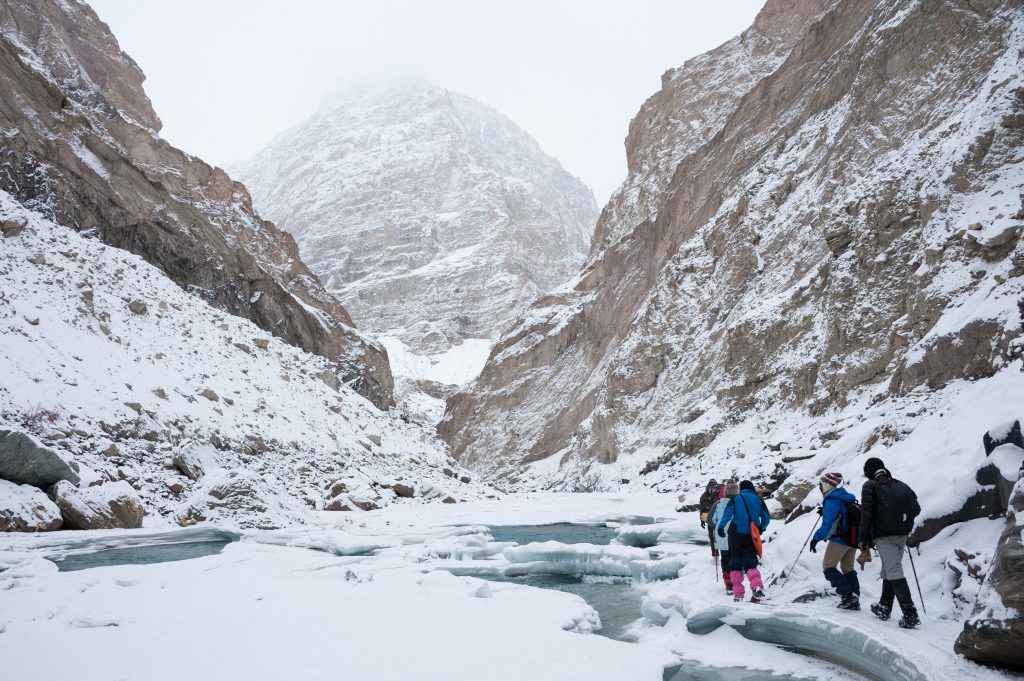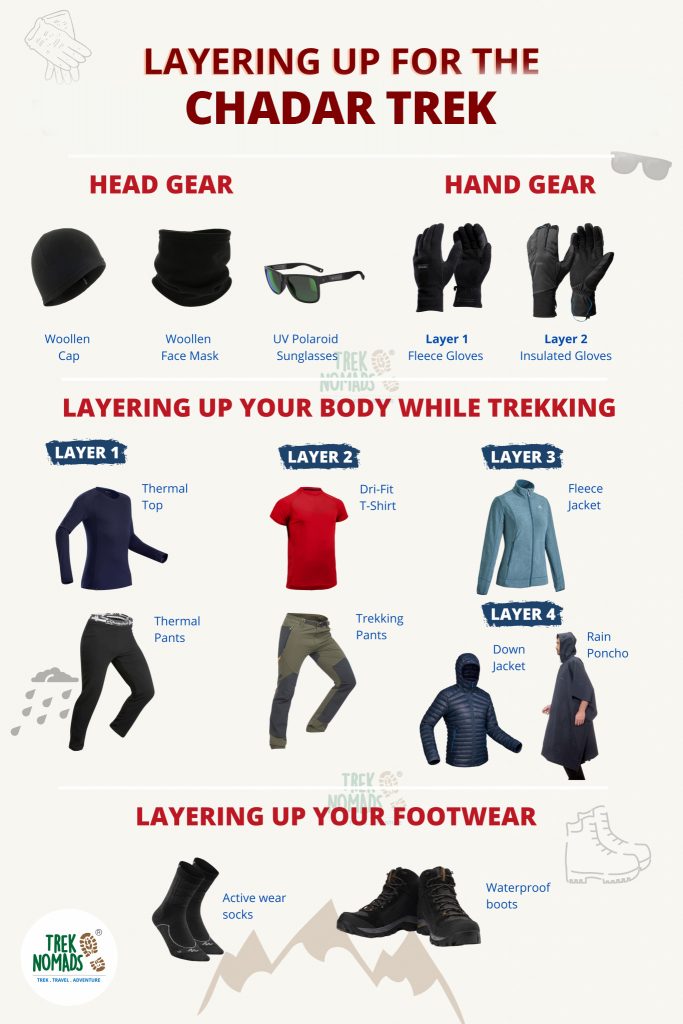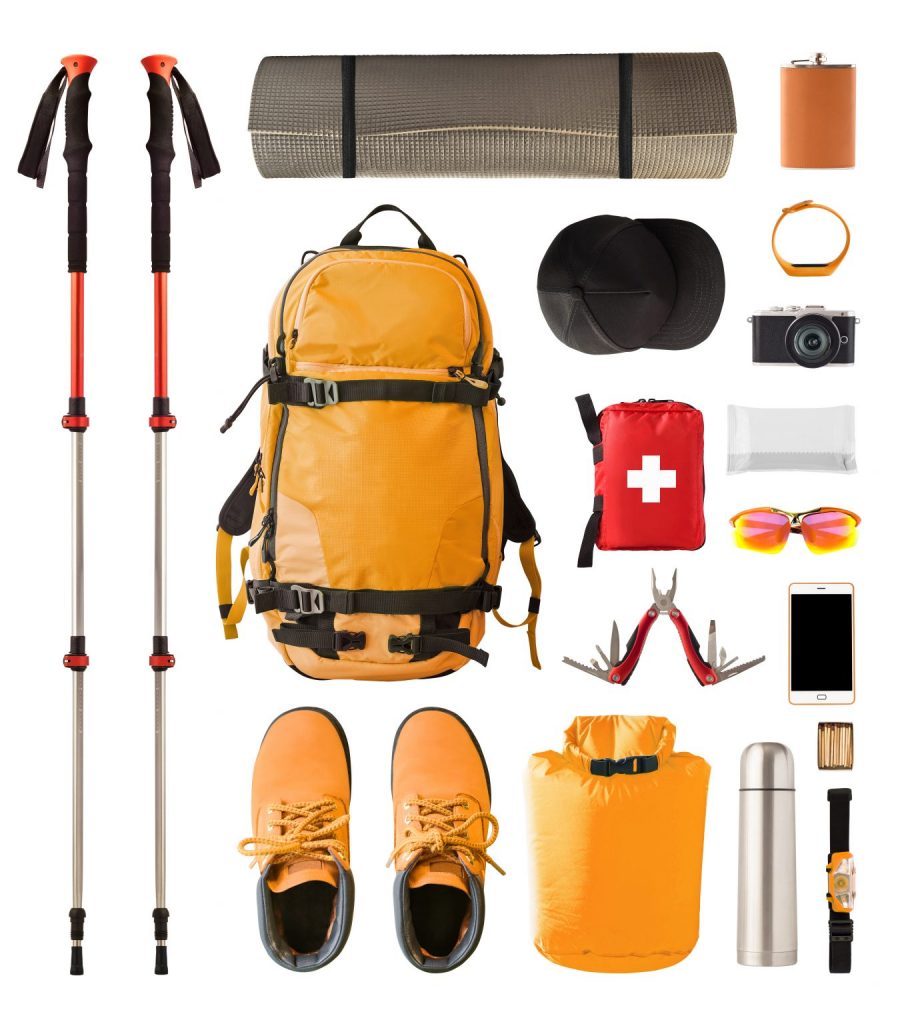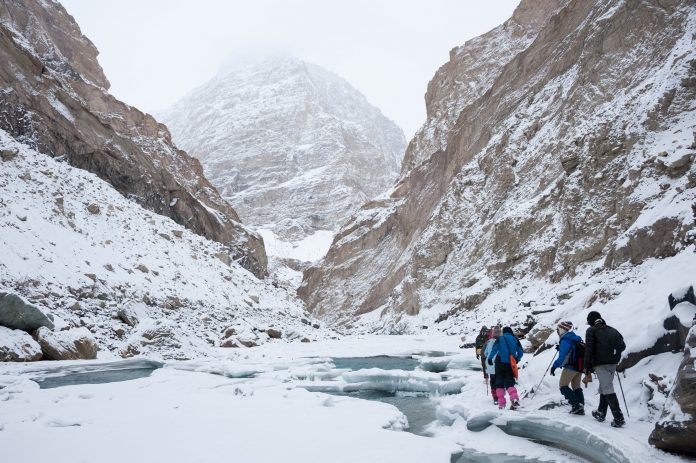We cannot stop emphasizing enough how thrilling the Chadar trek is! We also know that it sounds repetitive but the prospects of walking on water (Okay! Fine, frozen water), sudden snowfall, staying in tents- all of it sounds too exciting! As if this wasn’t enticing enough, the temperature drops to -27 to -30 degrees Celsius at night. The average daily distance varies between 12 to 15 km for 8 to 10 hours. The Chadar trek comes with challenges; hence, it makes sense to be ready for it!

While the physical and mental preparation will be discussed in another set of blogs, let us talk about the things to pack for the trek in this one. So, without further ado, here we go:
Chadar Trek Packing List
Footwear
Let’s start with the shoes because you will walk a lot in the snow and of course on them. Nothing very fancy about the footwear to get, but here are the basics that you will need
- Trekking Shoes: Make sure they are high-rise ankled, have waterproofing, and are insulated from outside
- Gum Boots: You will be wading through water too. You don’t have to carry them all the way from home because you can get good quality boots in Leh itself. Also, make sure you buy one size large to avoid shoe bites. Most local porters wear gumboots on the Chadar trek. They are easily available in Leh. This appears to be the most practical and cost-effective option for walking on the frozen Zanskar river. We will guide you on buying or renting these gumboots at Leh.
- Slippers: Make sure these are open-toe slippers. You would need to wear them at the campsite to let your feet breathe for a while.

Clothing Essentials
First of all, DO NOT OVERPACK! You will be lugging your backpack along on the trail; believe us, you wouldn’t want to carry the weight then! Hence, pack light, pack smart!
Avoid carrying sweaters as they occupy too much space. Replace them with fleece jackets as they keep you warmer, consume less space, and provide better insulation. Here is a ready list of stuff to pack:
- Synthetic Trek pants- 2-3
- Windcheater-1
- Upper and Lower thermals- 2 pair
- Warm Pants- 2
- Full sleeves collar t-shirts- 2 pair
- Down jacket
- Fleece jackets
- Merino Trekking Socks- 3-5 pairs
- Undergarments- 4-8 pairs
- Raincoat or poncho
Warmers
We are dedicating a section for this separately so you can imagine how important it is to keep warmers along. You see, you need to protect yourself from the biting cold of the sub-zero temperatures, and hence you will have to wear multiple layers of clothing to trap air between the layers and get effective insulation. There will also be other necessities, so you must be really “strategic” with your clothing.
For instance, when you walk during the day, the thermal insulators will absorb the sweat, losing their thermal properties and hence will become heavy. Thus, make sure to add moisture-wicking polypropylene-based inners as the base layer and wear fleece over it. Next, when you reach the camp, you can add two more layers of fleece and a down jacket. The uppermost layer should be such that it should keep rain, snow, and wind out. If you still feel cold, you can always add another layer beneath. DO NOT trek with Thermals during the trek. Thermals can be worn once you are at the camp. Thermals should be the base layer.
Now, coming back to what to pack. So the list is as under:
- Woolen gloves
- Synthetic waterproof gloves
- Woolen socks, especially for the nighttime
- A woolen balaclava to wrap around the neck
- A muffler

Toiletries
Next comes the stuff that will help you maintain very basic hygiene. Yes, we know that at such temperatures, your senses are barely there, and the virus and bacteria won’t survive as well, but everybody wants to wash hands after “the stuff,” and nobody wants chapped lips. So, here we go:
- Lip balm
- Sunscreen – SPF 50 or SPF 100
- Cold Cream
- Petroleum Jelly (Vaseline)
- Small toothpaste and toothbrush
- Small hand towel

Trek Equipments
The most important one. Say, you are ready with all the stuff, but how do you walk? How do you manage the sudden change in weather, and how do you manage to carry your stuff? Well, the list is shared below:
- UV protection sunglasses (because snow blindness is a thing) – Category 3 Polaroid Sunglasses
- Head Torch
- Daypack (25 to 30 Litres)
- Rucksack (50-60 Litres)
- Medicine Kit – basic medicines, please consult your physician for all required medicines.
- Body Warmers
- Hot water bag
- Thermos flask – 1 litre
- Trail munchies
- Ziplock or poly bags to compartmentalize wet, dry, and dirty stuff

And finally, as we conclude, here are a couple of things you can avoid entirely because they will be useless! You don’t need to carry jeans, trekking poles, microspikes, or crampons. You wouldn’t need sodas, alcohol, or packets of chips. Do not carry any plastic water bottles, and PLEASE keep your load within 10 kg.
With this, you should be covered!
Have a good trek!
